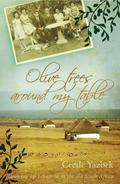Olive trees around my table is the warm-hearted and, at times, heart-breaking story of Cecile Yazbek; a Lebanese girl growing up in the fifties and sixties under the shadow of the new apartheid system in South Africa. Cecile paints a colourful portrait of her first generation South African Lebanese family: its faults, idiosyncrasies, shameful secrets and strengths. A family aware of the injustices perpetrated in the society, aware enough to take action where possible yet simultaneously benefiting from the privilege, advantages and eventual wealth accorded it, by being part of the ruling elite population. This very human story vividly describes how racism, as it destroys lives around her, intrudes on Cecile's own life through the streams of powerless people seeking out her politically active father. Shattering events at home and brushes with the secret police at university force Cecile to the conclusion that she must leave this society. Cecile ultimately finds refuge in the undulating hills surrounding Australia's Byron Bay but just as she settles into her new life in Australia, her own migration experience begins to resonate with the isolation and alienation of her grandparents in South Africa at the turn of the twentieth century. Suddenly, distant lives become close and Cecile knows she must find a way to put the ghosts of her family's past to rest if she is to find peace in her new life. Sifting through her memories and reacquainting herself with the hilarious, heroic and sometimes scandalous deeds of her extended family's past, Cecile finds harmony as she builds a new life for her children in Australia, her Lebanese-African childhood furnishing her memory and life with a rich and vibrant colour.


